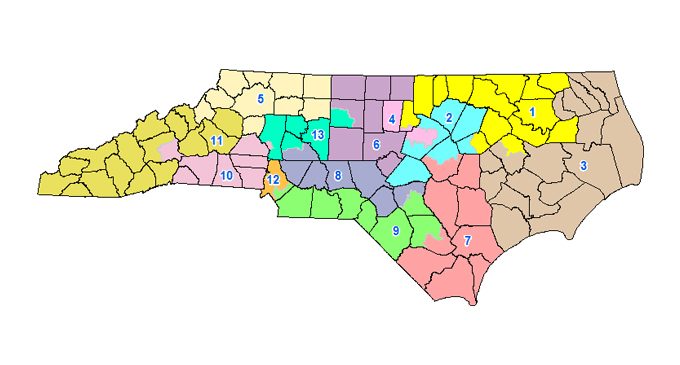Expert: GOP using voting law as ‘gerrymandering device’

There is a reason why Republicans in the N.C. General Assembly vigorously defend “stacking-and-packing” black voters into a handful of so-called “majority-minority” voting districts when drawing congressional and legislative maps for North Carolina, even though the U.S. Supreme Court has repeatedly ruled the practice as unconstitutional racial gerrymandering.
A reason that Law Professor and Constitutional Scholar Michael Curtis of Wake Forest University School of Law doesn’t buy.
Republicans maintain that they are complying with the mandate of the 1965 Voting Rights Act to create districts where black voters have the ability to elect congressional and legislative representation of their choosing.
So several wildly constructed districts were created by the Republican majority where black registered voters comprised at least 50 percent or more of the voting population.
“It all sounds like [Republicans] are wonderful and concerned with the rights of blacks, doesn’t it?” Professor Curtis asked rhetorically. “But the N.C. NAACP, black legislators, and a bunch of others sued about it, and say that’s not the real story.
“In virtually every one of the districts, the N.C. NAACP and others have challenged, the candidate of choice of black voters was winning without a majority black district,” Curtis continued. In those districts, blacks were less than 50 percent, but joined in coalition with white voters to elect candidates of their choice.
State Republicans, however, illegally and unconstitutionally twisted this reality.
“Instead of creating minority opportunity where it did not exist (as the 1965 VRA required), the (Republican) mapmakers drew districts where opportunity had been flourishing — where black voters, though the minority, had been consistently electing their candidates of choice…” reported Sharon McCloskey in May 2013 for N.C. Policy Watch. “[Republicans]… simply added more, pulling black voters across precinct, district and county lines to reach that 50 percent mark and beyond, up as high as 57 percent, and leaving whiter districts in their wake.”
One of the best examples happened right here in Forsyth County.
At least three white incumbent Democrats were moved out of their state Senate districts by the Republicans per the 2011 redistricting map, often just across the street, in order make it easier to shift black voters there from elsewhere.
One of those whites moved out was Linda Garrou of Winston-Salem, formerly a state senator representing District 32 from 1999 to 2013. Garrou had black opposition during her re-election campaigns, but she always won handily, because she also had strong black voter support.
But that changed when the Republicans took over the General Assembly in 2010.
Because of the 2011 redistricting map, Garrou’s home was moved into the Republican 31st District at the time, forcing her to either quit (which she did), or face an incumbent Republican in his own backyard.
Today, District 32 is represented by Sen. Paul Lowe, an African-American, and before him, Sen. Earline Parmon, the first black female to represent Forsyth County in the N.C. Senate. District 31 remains solidly Republican, and represented by Joyce Krawiec.
Professor Curtis said during a court hearing on how 2011 redistricting moved Garrou out of District 32, that Sen. Bob Rucho, one of the two top Republican lawmakers who directed the 2011 redistricting, was asked if Garrou would have been moved out of her district if she were a black incumbent, and Rucho said “No.”
District 32 needed to have more black Democrats, so that white Republicans could win elsewhere. As a result, the 1965 Voting Rights Act was actually used as a “gerrymandering device,” Professor Curtis said, an excuse to move African-American voters out of key voting districts where they normally would influence legislative and congressional races.
Curtis says state Republicans violated the N.C. Constitution when composing the 2011 legislative maps, ultimately making the legislative districts just about the worst in the nation. He maintains that the adoption of an independent, nonpartisan redistricting commission is the best answer for the future.
What will happen now isn’t clear. A three-judge federal panel has ordered all sides in the legal dispute over the legislative maps to submit arguments as quickly as possible so that a hearing can be held and a determination as to when new maps are redrawn, and possible special elections are held.
A federal trial scheduled for next week in Greensboro challenging the 2016 congressional maps has now been postponed to an undetermined date.
And on Monday, the U.S. Supreme Court agreed to hear a case challenging Republican partisan gerrymandering in Wisconsin next fall as going too far, a case that many legal experts believe could have major ramifications for the nation, and especially North Carolina.











